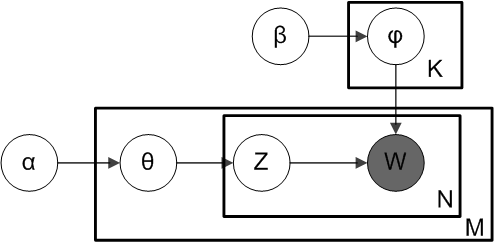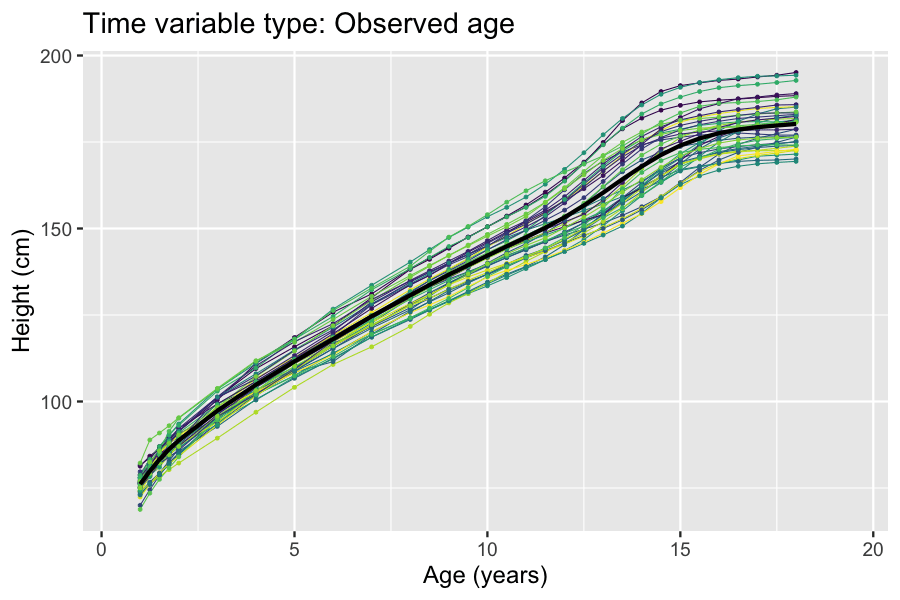|
Latent Dirichlet Allocation
In natural language processing, Latent Dirichlet Allocation (LDA) is a generative statistical model that explains a set of observations through unobserved groups, and each group explains why some parts of the data are similar. The LDA is an example of a topic model. In this, observations (e.g., words) are collected into documents, and each word's presence is attributable to one of the document's topics. Each document will contain a small number of topics. History In the context of population genetics, LDA was proposed by J. K. Pritchard, M. Stephens and P. Donnelly in 2000. LDA was applied in machine learning by David Blei, Andrew Ng and Michael I. Jordan in 2003. Overview Evolutionary biology and bio-medicine In evolutionary biology and bio-medicine, the model is used to detect the presence of structured genetic variation in a group of individuals. The model assumes that alleles carried by individuals under study have origin in various extant or past populations. The ... [...More Info...] [...Related Items...] OR: [Wikipedia] [Google] [Baidu] |
Natural Language Processing
Natural language processing (NLP) is an interdisciplinary subfield of linguistics, computer science, and artificial intelligence concerned with the interactions between computers and human language, in particular how to program computers to process and analyze large amounts of natural language data. The goal is a computer capable of "understanding" the contents of documents, including the contextual nuances of the language within them. The technology can then accurately extract information and insights contained in the documents as well as categorize and organize the documents themselves. Challenges in natural language processing frequently involve speech recognition, natural-language understanding, and natural-language generation. History Natural language processing has its roots in the 1950s. Already in 1950, Alan Turing published an article titled "Computing Machinery and Intelligence" which proposed what is now called the Turing test as a criterion of intelligence, t ... [...More Info...] [...Related Items...] OR: [Wikipedia] [Google] [Baidu] |
Computational Musicology
Computational musicology is an interdisciplinary research area between musicology and computer science. Computational musicology includes any disciplines that use computers in order to study music. It includes sub-disciplines such as mathematical music theory, computer music, systematic musicology, music information retrieval, computational musicology, digital musicology, sound and music computing, and music informatics. As this area of research is defined by the tools that it uses and its subject matter, research in computational musicology intersects with both the humanities and the sciences. The use of computers in order to study and analyze music generally began in the 1960s, although musicians have been using computers to assist them in the composition of music beginning in the 1950s. Today, computational musicology encompasses a wide range of research topics dealing with the multiple ways music can be represented. History This history of computational musicology generall ... [...More Info...] [...Related Items...] OR: [Wikipedia] [Google] [Baidu] |
Latent Variable
In statistics, latent variables (from Latin: present participle of ''lateo'', “lie hidden”) are variables that can only be inferred indirectly through a mathematical model from other observable variables that can be directly observed or measured. Such ''latent variable models'' are used in many disciplines, including political science, demography, engineering, medicine, ecology, physics, machine learning/artificial intelligence, bioinformatics, chemometrics, natural language processing, management and the social sciences. Latent variables may correspond to aspects of physical reality. These could in principle be measured, but may not be for practical reasons. In this situation, the term ''hidden variables'' is commonly used (reflecting the fact that the variables are meaningful, but not observable). Other latent variables correspond to abstract concepts, like categories, behavioral or mental states, or data structures. The terms ''hypothetical variables'' or ''hypothetical ... [...More Info...] [...Related Items...] OR: [Wikipedia] [Google] [Baidu] |


